Buying Property in Marbella
Thinking of buying a property in Marbella, Benahavís or Estepona areas? Our comprehensive Buyers Guide of expert advice will take you through the process step-by-step, from finding the right area to getting the best deal. Here’s everything you need to know. We’ve got you covered!
- Expert Guide to Buying Property in the Marbella area
- Choose a Real Estate Agent: Local Expertise & Quality Properties
- Find your Property in Marbella
- Instructing a Lawyer
- Buyer Requirements
- The Purchase Process
- Property Purchase Costs and Taxes
- Home Buyers Report
- KYC & AML Regulations
- Functions of the Notary
- The Golden Visa Program
- Fiscal Implications of Buying Property
- Conclusion
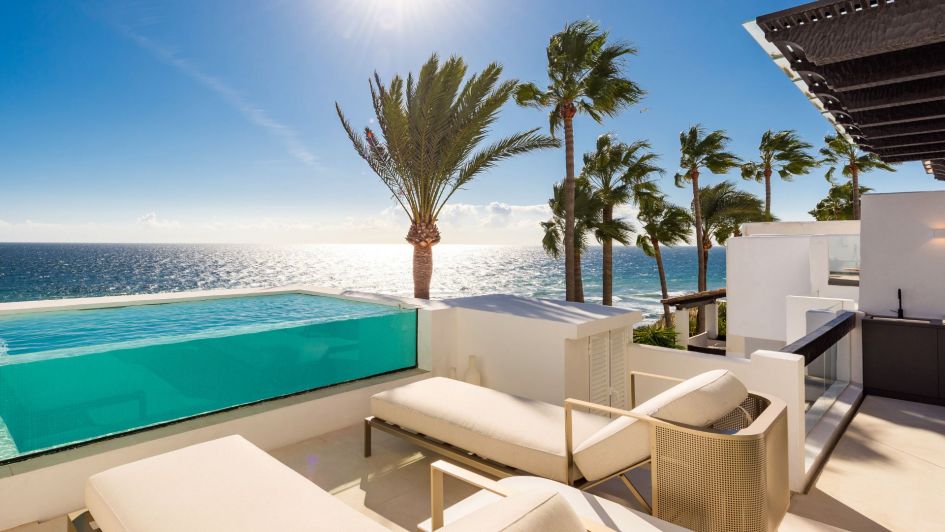
Expert Guide to Buying Property in the Marbella area
Marbella is a popular resort destination located in the southern region of Spain. With its warm climate, beautiful beaches, and breathtaking views, it is no wonder many people choose to invest in a property in this region. If you are considering buying a property in the Marbella, Benahavís or Estepona areas, you need to know a few essential things to make the process smooth and successful.
MPDunne has a professional and experienced team with expert knowledge of all topics in the real estate industry, such as professional valuations, legal conveyance, fiscal and investment parameters, planning laws and many other factors that come into play when buying a home.
One of the most critical points is getting the basics before you find your property. Nothing is more frustrating than finding the ideal property and being unable to proceed with the purchase as the necessary legalities and finances are not in place, and the opportunity to buy your perfect property is lost.
Before you start looking for a property in Marbella area, you need to do your research. Consider your budget, the location, and the type of property that interests you, your family and your lifestyle.
Choose a Real Estate Agent: Local Expertise & Quality Properties
Choosing the right estate agent can be crucial to the success of your purchase. It will make the process much easier to have a reliable, experienced agency with a proven track record working with you and on your behalf.
Look for an agency that specializes in the Marbella area and has a wide range of properties on their website. Check that they have an address and offices in Marbella.
The Marbella area has a peculiar situation in that the industry needs to be better regulated, and practically anyone can be a real estate agent. The web is full of property websites and seems like hundreds of agents, yet only a few top agencies have the properties directly.
MPDunne is a trusted listing agent, and most of our listings are direct instructions from the owners or developers. The qualified and experienced agencies have clear protocols for listing properties and will have the documentation in place and available for the lawyers regarding the sales process.
Most buyers come from other countries and are unfamiliar with Spanish laws and procedures, and a trusted person on the ground, so to speak, can make all the difference.
Aside from this, many buyers are extremely busy with overloaded agendas, and a good agent can assist with finding suitable properties for their clients. The professional agents will work for you and save you time and effort.
Therefore, it makes sense to appoint a qualified real estate agent with in-depth knowledge of the region and extensive experience in assisting both buying and selling in the area.

Find your Property in Marbella
Most people start on Google and proceed with emails and calls to local agents. For example, a simple search for property in Marbella will show hundreds of websites devoted to Marbella property, and the same properties appear on many sites.
This is because properties are often listed with multiple agents or shared across MLS (multiple listing) databases. There is an acute shortage of listings for prime Marbella properties, and many databases and websites need to be updated to reflect reality.
When clients call or email, they are informed that the property has been sold or is off the market. As many customers look online and only travel when they have found suitable properties, we nowadays arrange virtual property tours with the latest technology.
Our latest listings now have detailed videos and 360 virtual tours, which are very helpful in arriving at a short list of properties to view. Deciding on the area is one of the most important decisions to make, and this is where a good agent will assist in helping you to consider the best locations based on your budget and requirements.
The final detail is to attend property viewings, which your agent will arrange for you. Once you find the property, then the buying process can start in earnest.
Spanish Properties – Basic information
All the properties offered for sale in our database are freehold properties fully registered in the Spanish Land Registry offices. We do not work with timeshare or fractional ownership.
All Property in Spain must be registered in the “Registro de la Propiedad” or Land Registry. Therefore, the nota simple (land registry extract) is one of the most important documents as it will show the registered owner´s details and the charges against the property, such as the mortgage. It will also show any debts or liens recorded against the property. In addition, it confirms the plot size and m2 of the property, and the property type is fully described.
In Spain, the purchase and sale of a property are carried out in front of a notary. All properties are exchanged with the signature of a title deed known as the “escritura”. The process must be completely transparent, with the total purchase price declared, and all the funds used to buy the property accounted for before the notary.
The properties are usually sold free of charge, and liens and evidence has to be provided, which is part of the legal, due diligence checks. The property must have building permits and licences in place; again, all of this is part of the due diligence.
The property seller has to provide their full details; if a company owns the property, the administrator must provide the relevant documentation. If a power of attorney is used, this has to be up to date, and the notary will check this power before authorizing the sale or purchase of the property.
The notary will check all details on the title deeds (“escritura”) are correct and that all parties sign the document. At this point, the property is now transferred to the new owners.
All transactions pertaining to the transfer of a property must be registered in the Land Registry. Your lawyer pays the transfer tax or VAT (ITP) on your behalf and registers you as the new owner at the Land Registry.
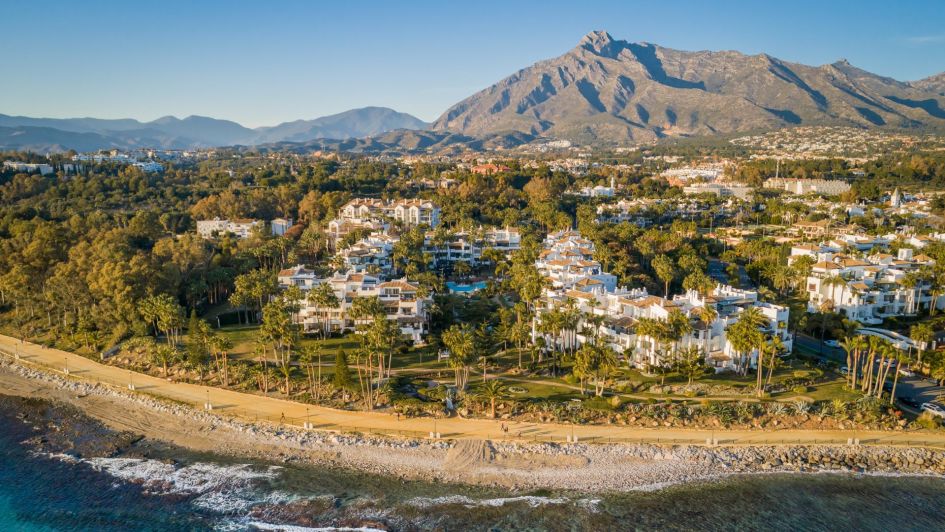
Instructing a Lawyer
Instructing your lawyers is one of the most important decisions regarding your property purchase. Marbella has many leading firms with long experience, and quite a few lawyers speak excellent English. In addition, some speak languages such as Swedish, Dutch, French and German, given the number of international buyers in Marbella.
Your lawyer will be with you for years to handle all your legal issues in Spain, not just your property purchase. In addition, they will look after and advise you on fiscal matters, making a will and so forth.
During the buying process, your lawyer will represent you and, as part of the due diligence, check the land registry and all town hall documents pertaining to the property that interests you.
Your lawyer should be independent and work for your best interests. A real estate agent is not a lawyer. While some companies offer legal services at low rates, our policy has always been to advise our clients to instruct their own lawyers.
If required, we can give recommendations to several reputable and highly professional international lawyers.
Depending on your circumstances and whether you intend to become a resident, it is well worth being fully informed by a fiscal expert about taxes due and implications to your tax obligations.
Your lawyer can advise on this or have an expert on his team do so.
Buyer Requirements
There are several things you will need to have prepared to enable you to buy a Property in Marbella, such as the following:
- NIE Foreigners ID or Numero de Identidad Extranjero: You will need an NIE number (a Spanish fiscal number identifying you as a foreigner) for all important transactions in Spain. For example, you will need your NIE to open a bank account and also at the notary when you come to sign for your property. Your lawyer will arrange this for you, as it can be time-consuming.
- Spanish Bank Account – Cuenta Bancaria: You will need to have a Spanish bank account for the property purchase. Once you have your NIE number, you can open a bank account. You also need the bank account to set up the direct debit payments for your domestic contracts on your new home, electricity, water, community, internet and alarm connection etc.
It is important to note that, due to SEPBLAC regulations, the Spanish Economic Ministry´s anti-money laundering authority, you must establish both your identity and the provenance of your funds. We, as agents, are also obligated to comply with these regulations. Therefore this step must be taken.
In addition, you will be requested to provide sometimes extensive information, so your lawyers can complete the KYC and AML (know your client & anti-money laundering) process.
Sometimes you may feel this is an intrusive process, but it´s not personal and is all part of the legally required compliance.
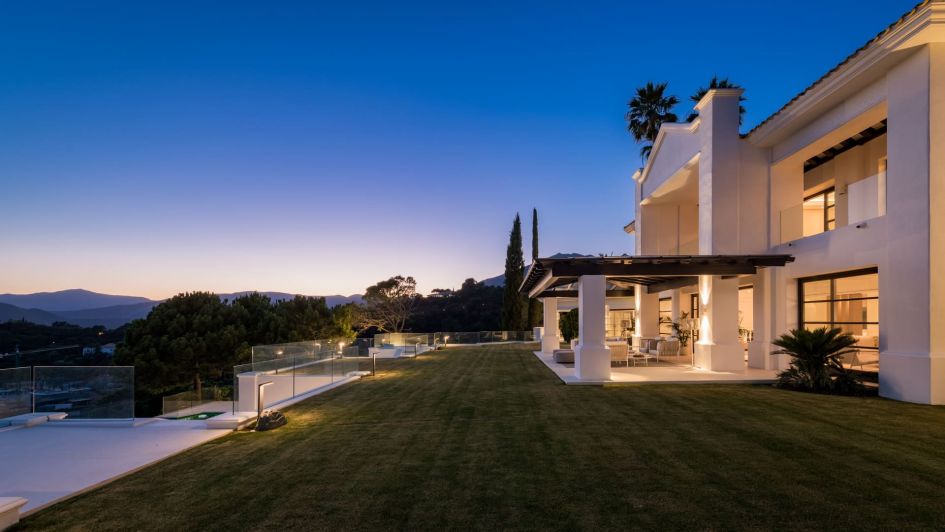
The Purchase Process
Once you find the property you like and decide to buy it the purchase process begins. The commercial agreement is usually reached with the buyer´s agent negotiating for the buyer either directly with the seller or the seller´s agent.
Having a professional, experienced real estate agent working for you can be beneficial as someone experienced in the Marbella property market will be a skilled negotiator, and they should be able to secure the best deal possible.
Making an Offer
When buying a resale property from a private seller, every sale is a world of its own, and the sellers will have their price, terms and circumstances. Marbella has a majority of homeowners with no mortgages and no financial stress to sell.
In our experience, the more robust the offer, the more weight it carries. We recommend making a firm offer in writing, with clear terms of price, proposed payments and deadlines for completion. We will make the offer based on your instructions to us.
The offer should outline the conditions and terms, and if the home is furnished, do you want the furniture and fixtures etc.? Any special conditions or requirements should be included in the original offer.
Sellers like to see offers in writing, with details of the person making the offer and the lawyer who will be instructed.
Serious clients tend to have serious lawyers and funds readily available should their offers be accepted. A buyer with everything in place and ready to move quickly will have a much higher chance of succeeding than a casual verbal offer with vague promises of payment.
The same goes for deposits; nothing carries more weight than a buyer with the funds already in their Spanish bank account or escrow with their lawyers. The agent acts as a buffer in the negotiations, and it is not advisable to put the buyer and seller together, at least in the initial stages.
If you are purchasing in a new development or an off-plan villa. The developers will set their prices and usually only entertain offers for multiple units. Most new developments are sold off plan as there is a higher demand for new properties.
Offer Accepted
Once your offer has been accepted, it´s time for the legal team to get involved and take the following steps to arrange the private contracts and deposit payments on your behalf.
A professional agent will lay out everything and usually introduce everyone involved, inform the lawyers of who is representing whom, provide their contact details, and request that they get in contact to arrange the property purchase.
The buyer should instruct their legal team and arrange to have funds available for the deposits to be paid.
Reservation Contract o Documento de Reserva
The Marbella market has heated up considerably since 2020 after Covid with unprecedented demand for homes, particularly affecting the villa properties and the off-plan new builds.
Due to this, it has become standard practice for the sellers to request that a reservation be paid to allow them to take the property off the market and, indeed, for the buyer to want to do this to ensure they get the property.
A fee and time are agreed upon, which can be anywhere from €6,000 – €50,000 up to 1% firm offer and 7-15 days or more, and during this time, the buyers´ legal representative undertake the due diligence process.
If the buyer proceeds, the amount paid becomes part of the purchase price. However, if the buyer decides not to move forward due to a change of mind, the reservation fee will be forfeited as compensation to the owner for taking it off the market.
This reservation is placed in escrow with your lawyer and usually is passed to the seller´s lawyers with the signature of the reservation document.
Reservation deposits are fully refundable if the property fails to satisfy the due diligence or an issue prevents its sale.
Private Contract with 10% payment
Once the reservation contract is signed, The Private contract is the next step, which entails payment of 10% less the reservation paid. This is a very important part of the process and is only signed when your lawyers fully complete the due diligence. It effectively seals the deal, with the final remaining step being completion at the notary office.
Some buyers prefer to go directly to the 10% payment and contract, particularly for the more expensive properties. In this case, they instruct their lawyers and send 10% funds to their lawyer´s escrow account.
The lawyers will have their preferences as PPC contracts signed, but here are the main types of private contracts in Spain with 10% payment. The most usual contracts are:
- Penitential deposit Contract – Contrato de Arras penitenciales:
One of the most widely used contracts in Spain for property purchase which, as its name suggests, has heavy penalties for both sides if they do not sell or buy under the agreed terms.
It is a binding contract between the parties. If the buyer does not complete the purchase, they will forfeit the 10% paid, and if the vendor wants to break the contract, they must pay double the 10%.
- Option to purchase – Contrato opción de compra:
In this contract, the seller gives the buyer an option to purchase for an agreed price of the option, usually 10% of the purchase price in an agreed time frame. Both sides are obliged to buy and sell and can be forced to do so via the courts.
If you fail to fulfil the option payment, the seller can keep your funds as you have failed to complete your option in the time frame agreed. There is no requirement to notify you or to extend the option contract should you fail to pay and no recourse for failure.
- Private purchase contract – Contrato Privado de Compraventa:
This contract does not give the seller the right to back out with a penalty payment. If the buyer doesn´t buy the property, they lose the 10% paid, and the contract is no longer valid.
Once you have your private contract signed and the deposit paid, the rest usually goes smoothly to the notary and completion, and the house is yours pending the notary´s completion.
The keys and possession of the property are handed over when you sign the new title deeds.
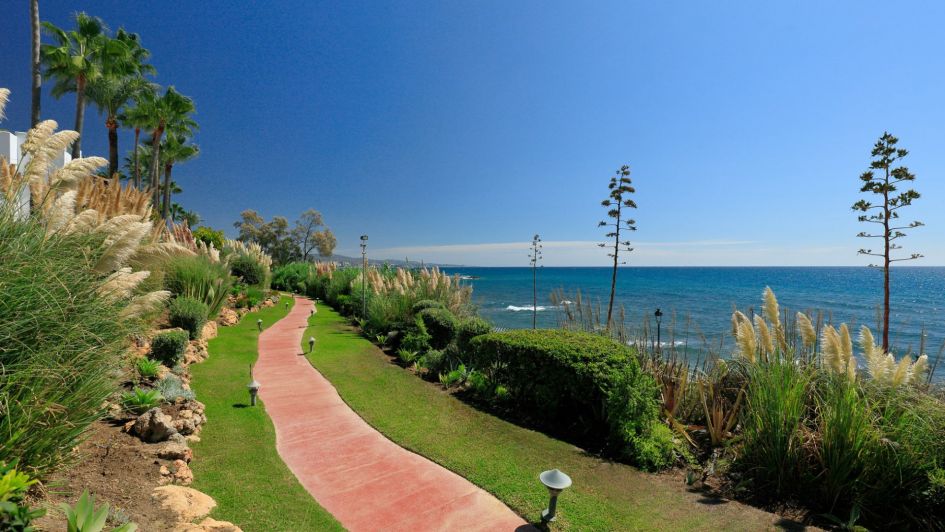
Property Purchase Costs and Taxes
When buying a property in Marbella, the advertised sales price does not include the purchase costs. You will have additional costs such as transfer taxes, legal fees, land registry charges and notary costs. Factoring them into your budget is essential.
As a rule of thumb, you should budget to pay around 10% of the cost of the property in fees and taxes and around 12% on a new build property bought from a developer.
Transfer tax: When buying a resale property in Marbella, you must pay a property transfer tax, also known as Impuesto de Transmisiones Patrimoniales (ITP). The tax rate varies depending on the property´s purchase price but typically ranges between 7% and 10%.
In Andalucia, the regional government introduced a reduction in transfer tax and reduced the rate to a blanket 7% for resale properties.
VAT tax: If the property is a new property purchased from a developer, the tax paid is VAT (IVA) at 10% for residential properties.
IAJD tax: For new properties, an additional tax must be added to the VAT in the Documented Legal Acts tax (IAJD, also often known simply as AJD). This is 1.2% in Andalucia and does not apply to resale properties.
Notary and registry fees: The Spanish state regulates the notary fees, so they charge the same for similar services. For new title deeds, the cost is usually from about 800 euros to a few thousand, depending on the number of folios used and the property price.
You must also pay the land registry fees to register the deeds the notary has signed of around 400-700 euros.
Once again, these fees are fixed by Spanish regulations and depend directly on the property´s price, although they are usually between 500 and 1000 euros.
Legal fees: It is highly recommended to engage a lawyer when buying a property in Marbella to ensure that all legal requirements are met. Legal fees vary depending on the transaction´s complexity but are typically around 1% of the purchase price.
Mortgage costs: If you are taking out a mortgage to buy a property in Marbella, additional charges will include mortgage arrangement fees, valuation fees and mortgage insurance usually around 1% of the mortgage value. Most banks will finance between 70 -80% of the property value, meaning that if you are purchasing with a mortgage you will need to have a deposit of atleast 30-40% of the property value to cover mortgage and other taxes and costs.
Other costs: Other costs may be associated with buying a property in Marbella, such as bank commissions, home insurance and utilities.
In conclusion, buying a property in Marbella involves various costs and taxes that you must consider. Your lawyers will explain your purchase´s specific costs and taxes and ensure you comply with all legal requirements.

Home Buyers Report
A property survey is not required by law in Spain. For a mortgage, the banks only require a formal valuation of the property carried out by a professional member of a valuation company.
It is not standard practice in Spain to request a technical home survey. Still, it is prudent to have an independent home buyer survey check out the property, particularly when buying a villa. It is important to remember that a property survey differs from a property valuation, which assesses the property´s market value.
A property valuation is typically conducted by a real estate agent or a professional appraiser to determine the property´s fair market value.
A property survey in Spain is an inspection by a professional technical engineer, who will examine the property´s physical condition and identify any defects or issues that may affect its value or safety. Professional valuers or technical engineers have licensed officials; their reports conform to Spanish regulations.
We have several professionals available who can provide this service.
KYC & AML Regulations
When buying property in Marbella, it is paramount to be aware of the Know Your Customer (KYC) and Anti-Money Laundering (AML) regulations that are in place. These regulations prevent criminal activity in the real estate sector, such as money laundering.
Under Spanish law, real estate agents and other professionals involved in real estate transactions must identify their clients and apply due diligence to their financial transactions.
This means they will have to provide identification documents, such as a passport or national identity card, and proof of their source of funds. The aim is to ensure that the funds you use to purchase the property are not derived from criminal activity.
Your lawyers will arrange this with you and confirm to the agents and seller lawyers that they have completed the KYC for their client.
It is essential to bear in mind that failure to comply with these regulations can lead to severe penalties, both for the real estate agency and the buyer.
Your lawyer will advise you on your obligations under KYC and AML regulations and ensure you comply with all the requirements.
Functions of the Notary
When buying a property in Marbella, one of the key steps in the process is the involvement of a notary. The notary is a public official responsible for certifying legal documents and transactions and plays an essential role in the property purchase process.
Here are some of the primary responsibilities of the notary when buying a property in Marbella:
Reviewing and certifying the purchase title deeds: The notary will review the purchase deeds and ensure they comply with all legal requirements. They will then approve the contract by signing and stamping it.
Ensuring compliance with legal requirements: The notary will ensure that all legal requirements have been met, such as verifying the identities of the parties involved in the transaction and ensuring that everything is in order and has been confirmed and all documents are valid.
Verifying the property is free of charge: The notary will ensure that the property is free of charge, that any mortgage or debts have been discharged or funds retained to cover those amounts, and that the payment has been adequately documented. He will also review the payments made for the property to ensure the funds are accounted for.
Registering the property: Once the purchase contract has been authorized, the notary will arrange to register the property with the local land registry. This is an important step that confirms the transfer of ownership and ensures that the new owner´s rights are protected.
Transfer of the funds: The notary is responsible for overseeing the handing over of the funds related to the purchase transaction as the checks are paid in front of the notary. If it is by transfer, he must ensure the buyer has confirmed receipt of funds into their account.
Overall, the notary plays a critical role in the property purchase process in Marbella. They ensure that the transaction complies with all legal requirements and help protect the interests of both the
buyer and the seller.
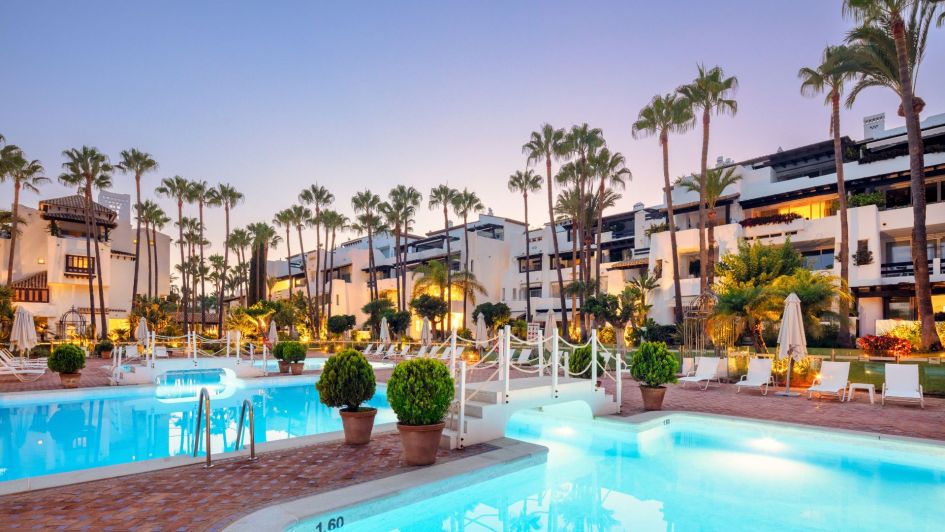
The Golden Visa Program
Spain offers a Golden Visa program that allows non-EU citizens to obtain residency in Spain by investing in real estate. By purchasing a property with a minimum purchase price of €500.000, the new homeowner becomes automatically eligible to live and work in Spain.
To qualify for a Golden Visa, specific requirements must be met, including those related to property investment.
Requirements for a Golden Visa in Spain:
Minimum investment amount: The minimum investment amount for a Golden Visa in Spain is €500,000. This investment can be made in one or multiple properties.
Investment in real estate: The investment must be made in real estate, and the property must be purchased outright, with no financing or mortgage involved.
Property ownership: The investor must own the property outright and be registered in their name.
Residency requirements: The investor is obliged to spend at least 183 days per year in Spain to maintain residency status.
Background checks: The investor must pass a background check to ensure they have not been involved in criminal activity.
Health insurance: The investor must have health insurance that covers them in Spain.
It is important to note that these requirements are subject to change. Therefore, seeking professional advice and consulting the official government website for up-to-date information is always recommended.
In conclusion, to obtain a Golden Visa when buying a property in Marbella, the investor must make a minimum investment of €500,000 in real estate, own the property outright, and meet the other residency and legal requirements.
Fiscal Implications of Buying Property
Buying a property in Spain does not automatically make you a tax resident in Spain. Having fiscal representation will ensure you comply with the rules and regulations regarding your financial responsibilities, whether you are a resident from within the EU or outside the EU.
The rules have become more complicated for UK residents following Brexit. For example, UK residents in Spain are now allowed exclusively 90 days within 180 days.
For any nationality, EU or outside, even if you adhere to these regulations but have a spouse and children who live and attend school here, you may be considered a resident and taxed accordingly. This is a personal situation for each case and requires fiscal advice from a qualified professional.
All buyers and investors of property in Marbella should be well informed on the fiscal implications of their investments in Spain. If you spend more than 183 days in Spain in a calendar year, you may be considered a tax resident in Spain under Spanish tax law.
However, effectively it means that you would be obliged to make your tax returns in Spain and pay tax on your worldwide income, which is standard in most countries.
To avoid potential tax issues, seeking professional tax advice in Spain and your home country is essential. A tax advisor can help you understand the tax implications of owning a property in Spain and ensure you meet all the necessary tax obligations.
Conclusion
In conclusion, buying property in Marbella can be a great experience and a good investment, but it is advisable to be aware of the potential pitfalls and avoid them. Working with trusted professionals, thoroughly researching the property and the area, and budgeting for all expenses and taxes can help ensure a successful and stress-free purchase.
MPDunne & Hamptons International has provided expert advice to clients buying and selling homes for many years. We are a leading agency in Marbella with a reputation for professionalism and integrity built over many years of business in Marbella Real Estate. We strive to provide an exceptional buyer & seller experience and aim for the highest professional standards in our industry.
Throughout the buying process, we ensure that all stages are thoroughly explained so there can be no misunderstandings that complicate the purchase of your dream home.
Starting by researching and engaging a professional team to work on your behalf will go a long way to making the process stress free. With the proper guidance, you can find the perfect property in Marbella and enjoy all this beautiful region has to offer.
We have built up an extensive network of respected professionals whom we can recommend as they share the same ethics of professionalism, depth of knowledge and commitment to their clients.
We hope you found this helpful guide. We aim to give a general idea of what´s in store when buying a Marbella home.
It is, however, only a guide, we advise our clients to take legal and fiscal advice to finalize the purchase process.
